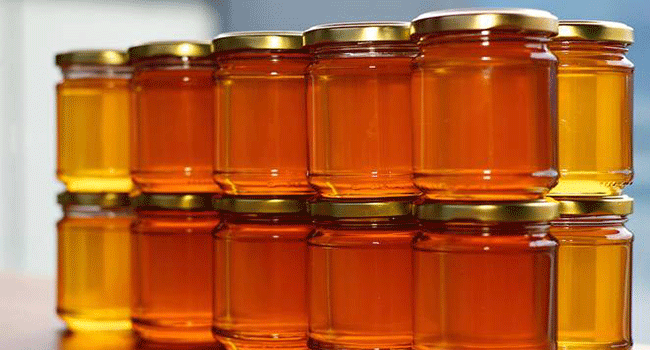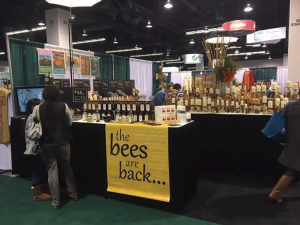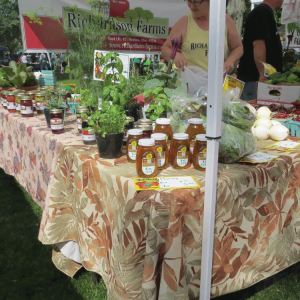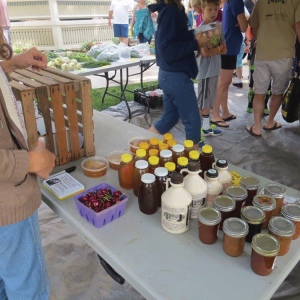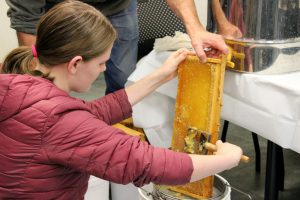By: Leo Sharashkin
A Missouri statute says: “Farmer not merchant.” That’s spot on: for many farmers and beekeepers bringing in a great crop is far easier than marketing it.
Historically, beekeepers sold much of their crop wholesale to honey merchants, but today commodity prices are rock-bottom low. A small producer just cannot afford selling at that price.
This makes direct-to-customer sales particularly attractive, but it is not always an easy proposition. If your honey rises above the rest – say, it has a particularly wonderful flavor, or your operation is treatment-free – it certainly deserves a higher price, but that makes selling it harder still. In nature, if you stick out above the crowd, you perish: a tree that towers above the forest’s canopy gets hit by lightning. Your amazing honey is $10/lb; a nearby packer brandishes their “local” honey at half the price, and even then the consumer hesitates: she knows she can pick up Grade A clover honey at Walmart for less than $3/lb.
Add to it the global nature of today’s economy. Not only international competition drives prices down for everybody, but honeys from all over the world are at the fingertips of the consumer. Many of them have remarkable flavor and purity. Why should the customer give her business to you?
You have one big advantage. You have a chance to develop a personal relationship with the customer and share the story behind the product. As the great Polish beekeeper Julian Lubieniecki put it, honey is produced not by the hive or the bees, but by your knowledge and understanding. Likewise, even excellent honey does not sell itself, it is being sold by you. And the more people are attracted to you, the more they will be interested in the products you offer.
One thing that often stands in the way of this attraction is your attitude to the potential customer and to the selling activity. Are you enjoying it? No? Then people will sense it, even if you wear a smile on your face. Are you interested in the person buying your honey, or only in the cash in her pocket? The adage “the customer is always right” betrays this very attitude. Yes, we all need income, but we take it so seriously we throw the baby out with the bath water. “Do you know why the sun rises in the sky?” asked my son Yarosvet. – “Why?” – “So Americans can go to work.”
Money can come through toil. “The more you work, the luckier you get,” told me the owner of the inn where my wife and I stayed for our honeymoon. Really? The hardest-working person I’ve known worked 84-hour weeks (24-hr shifts every other day). A lucky man? Judge for yourself: he was earning good money, but his wife and child left him (he was either at work or asleep). He started drinking, relatives turned away from him, and even neighbors were dreaming of moving elsewhere.
Luck and success are not measured by the amount of effort. The original meaning of the word luck is light. Just as butterflies are attracted to the candlelight, we are attracted to people who are easy-going and happy. A truly successful salesperson likes people and is having fun. If people like you, the money will be “added onto you.” To the point that ultimately, “the product does not make any ******* difference,” as one king of mail order put it.
When I studied at HEC, France’s top business school, our coursework was complemented with yoga lessons, wine tastings, classes in medieval Chinese art, ski trips, a visit to the Salvador Dali museum in Barcelona, private fireworks, and after the last lecture of the day the professor might take the whole group to an authentic oriental restaurant. Why were they doing that? To convey the understanding that business is not limited to accounting, finance, management, and sales. The enjoyment of life (savoir vivre in French) is essential to success, whether you are selling honey or sailboats.
Thankfully, this light of luck can be ignited. And the most powerful ignition switch that I am aware of is laughter. From the ancient times laughter was seen as a better way of overcoming difficulties than the “trouble-shooting” mode that our society teaches us today. If you laugh at your problems and don’t take them seriously, they no longer exist. All tension is released. You no longer care whether that person buys your jar of honey or not – you are having a great time regardless. You start glowing with a positive attitude, and this attracts people. And your customers are human beings, too. In fact, you cannot even be human without humor. Look up the meaning of humor in the dictionary – it is the life, the blood that flows in your veins.
- . . . or this?
- . . . or this?
The customer is always right. By the same token, the customer is never wrong. And if she walks past your stall at the market without stopping, or raises her brow when hearing the price of your honey, there is nothing wrong with her, you, or your product. You just need to infuse the situation with light and laughter, and things start magically changing on the spot.
This all sounds wonderful, but what exactly do I do if I have difficulty selling my honey crop at the price that I feel it deserves?
The most efficient techniques that I know of are described in The Art of Soaring and The Power of Luck by Dolokhov and Gurangov. These books sold over a million copies in the original Russian edition, and helped me so much that I translated them into English so everyone can benefit from this knowledge. Each volume describes very simple psychological tools for turning any situation around, and gives numerous real-life examples of people successfully applying them to resolve their issues – be it money, relationships, or even health.
One of my favorite Art of Soaring techniques is composing soaring verse. You write a little whimsical poem that makes you laugh at your problem, or just gives you a smile. Then recite it as needed, and the problem will cease to exist. I’ve composed numerous soaring poems to help me with beekeeping activities: anything from catching more swarms to selling my honey. It really works, and I would like to share with you one poem that proved especially effective. It is called Flying Out The Door.
Flying Out The Door
I wake up in the morning
Open my eyes and lo!
Ten thousand jars of honey
Are flying out the door!
It is not even puzzling –
I’ve read in ancient lore
That honey jars love buzzing
While flying out the door!
I’m fixing a fish sandwich
With honeycomb galore
To share with the bees which
Are flying out the door!
My daughter’s friendly pony
Hauls barrels to and fro
Filled with my sumac honey
That’s flying out the door.
A spaceship lands, and aliens
Whom no one saw before
Arrive to buy some honey
That’s flying out the door.
“Who’s that?” – “That’s Oprah calling.
Would you come to my show
To talk of jars of honey
Flying out your door?”
Two tribes of ancient Maya
Prepare to go to war
To win some jars of honey
Flying out my door.
Dressed in flashy feathers,
Riding a dodo,
Dodging jars of honey
Flying out the door.
Hollywood producers
Take shifts, sleep on the floor,
Filming jars of honey
Flying out the door.
The airport controllers
Trust their screens no more
Skies filled with jars of honey
Flying out the door.
Mailbox stuffed with letters,
Orders by the score
And honey, for that matter,
Just flies outside my door.
My darling lovely honey –
She cannot pack no more
Three tons of ordered honey
That’s flying out the door.
Behold the new times coming
Waves stick to beebread shore
A million jars of honey
Flying out my door.
With empty cardboard boxes
I’ll build swarm traps – and more
To catch some jars, and foxes
Flying out the door!
I’m walking in a bee suit,
I wield a cedar oar.
My home’s a hive – jars soaring
And flying out the door!
As you can imagine, silently repeating this verse, I greet my customers with a smile and do not experience any problems selling my honey at $20/lb or more. To sense these waves of positivity emanating from you, your customers do not even need to be physically present: I sell most of my honey online and many of my best clients I’ve never met in person.
And if all this sounds too odd, consider this: different songs, chants, and prayers were part of beekeeping practice for thousands of years, and Eva Crane devotes an entire section to them in her comprehensive World History of Beekeeping and Honey Hunting.
I know from direct experience that soaring poems have been helping many other beekeepers to sell their honey successfully. And not just beekeepers – the effect of these poems is so strong that Russian food manufacturers now print them on the packaging of their products. One of the famous brands carries the verse: “To avoid any malaise, eat more or our mayonnaise!”
I teach soaring verse writing at my workshops that attract beekeepers from all over the country, even from overseas. On occasion, I’ve even composed poems for beekeeper friends to help them with their sales. For example, one year my friend Jeremy Coil (name changed for privacy) had problems selling his section comb honey, which was his specialty. The distributor he previously worked with retired and went out of business, and others were not willing to pay high enough price. Jeremy was left with some 2,000 lb of sections that he needed to move. He did not have enough freezer space to store that quantity of comb and was not very happy: he’s the kind of man who would rather be in the beeyard carrying 50-lb supers than speak to a store manager on the phone.
I composed and sent him the following verse, Moving Comb, along with the instructions for using it (“repeat often while looking at yourself in the mirror until the frown disappears from your forehead”). Here it is:
Moving Comb
No Sherlock Holmes or Conan Doyle
With their brains protruding
Could imagine how Jeremy Coil
Truckloads of comb would be moving.
Mountains of supers – o mournful toil!
But nothing can stop from brewing
The infinite power with which Jeremy Coil
Truckloads of comb is moving.
Thriving like grass on well-watered soil
(Just hear the happy cows mooing!)
Cheerful and handsome lad Jeremy Coil
Truckloads of comb is moving.
Kids open textbooks and read Tolstoy —
Enchanting and funny and soothing
The timeless story of how Jeremy Coil
Truckloads of comb was moving.
Wrapped in thin paper and golden foil
Comb honey you’ll never stop chewing
Shows on the package how Jeremy Coil
Truckloads of comb is moving.
The world may run out of forests and oil –
A predicament of its own doing,
But nothing is lost while Jeremy Coil
Truckloads of comb is moving.
As expected, the poem did the trick. “I never had a poem dedicated to me before!” said Jeremy with a grin. I did not hear from him for a year, but when we met again, it turned out everything had gone well. He had even developed a novelty product: raspberry-flavored comb honey, and was able to move all his inventory through several regional health food stores.
You do not have to be a gifted poet or writer to come up with your own soaring verse. Keep trying – and just as good mead, they improve with age. If you find The Art of Soaring helpful, please let me know – I’d love to hear your stories and read your poems. And if you are still not confident you can do it, let me help you with the first couple lines:
My honey combs her hair with comb honey
So I keep telling her she’s very sweet!
Can you come up with the rest on your own?
For additional inspiration and guidance, please see the book The Art of Soaring and its sequel The Power of Luck. You can get them from my website: HorizontalHive.com/art.
Dr. Leo Sharashkin is editor of Keeping Bees With a Smile, a comprehensive resource on natural beekeeping and horizontal hives. He is a regular contributor to Bee Culture. His treatment-free apiary in the Ozarks is composed entirely of local survivor-stock bees obtained from the wild using swarm traps. His website (including free plans, advice, and talk schedule): www.HorizontalHive.com






